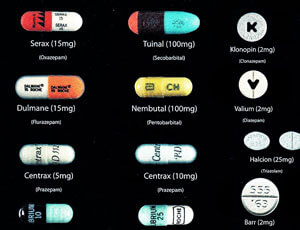Depressants are controlled substances – Schedule I, II, and IV
What are depressants?
Prescription depressants are designed to put a person to sleep, relieve anxiety, soothe muscle spasms or prevent seizures. Depressants work by slowing down or depressing brain activity.
The best-known depressants are barbiturates including Fiorina, phenobarbital, Pentothal, Seconal and Nembutal; and benzodiazepines including Valium, Xanax, Halcion, Ativan, Klonopin and Restoril. When used as prescribed, these drugs have legitimate benefits. Barbiturates are used to treat seizures and as anesthetics during major surgery. Benzodiazepines treat both anxiety and sleep disorders.
Ambien and Sonata are also classified as depressants and are approved for short-term treatment of insomnia. They share many properties with benzodiazepines.
Common names include Barbs, Benzos, Downers, Liquid X, Nerve Pills, Phennies, Reds, Roofies, Rophies, Tranks and Yellows.
What do depressants look like?
Depressants come in a variety of multicolored pills and tablets, and some barbiturates also come in syrups and injectable liquids.
How are depressants abused?
People abuse depressants by taking them in manners other than prescribed or recreationally. People abuse depressants to feel euphoric or, when taken in combination with other drugs, to add to the high or deal with side effects. Abusers also typically take higher doses.
Using depressants to get high can be dangerous, as there is such a small difference between a proper dose and an overdose. Any miscalculation with barbiturate use can lead to coma, respiratory distress and even death. Benzodiazepines also have the potential to be harmful, as they can cause over-sedation, memory impairment, poor motor coordination and confusion.
How do depressants affect a person?
Most depressants affect the brain by increasing the activity of gamma-aminobutyric acid (GABA), a brain chemical responsible for sending messages between cells. The increased GABA activity slows down brain activity. This causes a relaxing effect; however, too much GABA can be a problem.
Depressants can cause amnesia, reduce reaction time, impair mental functioning and cause confusion. Some depressants relax the muscles and cause some unwanted side effects including slurred speech, loss of motor coordination, weakness, headache, lightheadedness, blurred vision, dizziness, nausea, vomiting, low blood pressure and slowed breathing.
What are the health effects/risks of using depressants?
Depressants work by slowing the brain’s activity, and when a person stops taking them, there can be a rebound effect. This can result in seizures or other harmful consequences. Users can also rapidly develop dependence on and tolerance to depressants. Combining any of these drugs, or using them with alcohol, can also lead to very dangerous side effects and can slow heart rate and breathing enough to cause death.
Prolonged use of depressants can lead to physical dependence even at doses recommended for medical treatment. Withdrawals from depressants can be life threatening.


